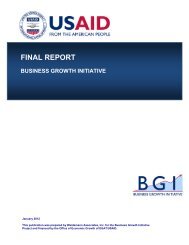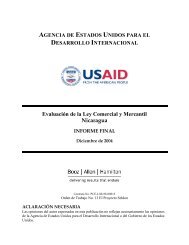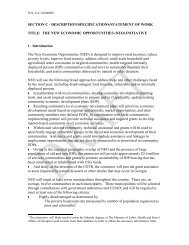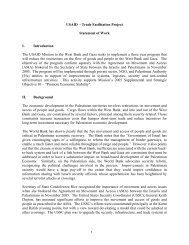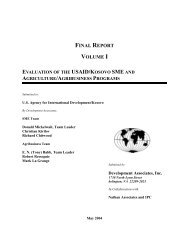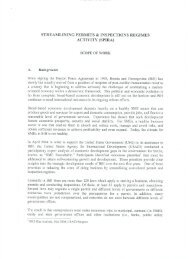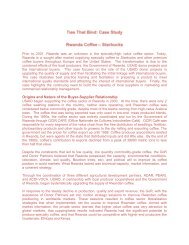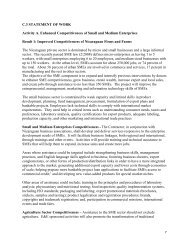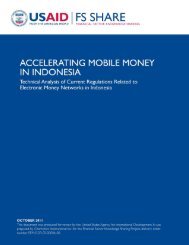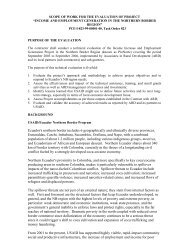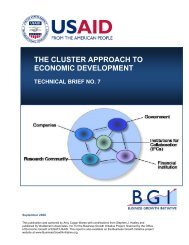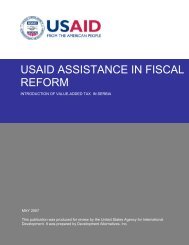Property Tax Reform in Developing and Transition Countries
Property Tax Reform in Developing and Transition Countries
Property Tax Reform in Developing and Transition Countries
You also want an ePaper? Increase the reach of your titles
YUMPU automatically turns print PDFs into web optimized ePapers that Google loves.
capacity is much more limited. Moreover, the tax base almost always is narrowed by legal exemptions,<br />
perhaps even more so than <strong>in</strong> <strong>in</strong>dustrialized countries. The result is that taxes are paid on a base that often<br />
bears little resemblance to the true level of property values. These constra<strong>in</strong>ts to good practice need not<br />
be permanent, however, <strong>and</strong> they can be removed or eased over time. The caution we cont<strong>in</strong>ue to return to<br />
<strong>in</strong> this paper is that analysts <strong>and</strong> policy makers need to structure the property tax to fit the circumstances<br />
of a particular country, rather than try<strong>in</strong>g to emulate the practice <strong>in</strong> <strong>in</strong>dustrialized countries. If a proper<br />
development plan for the property tax is put <strong>in</strong> place, it can evolve over time to realize many of its<br />
potential advantages.<br />
3. Democratic Local Governance <strong>and</strong> the <strong>Property</strong> <strong>Tax</strong><br />
Broadly def<strong>in</strong>ed, fiscal decentralization is the empowerment of people by the empowerment of their local<br />
governments (Bahl, 2008). The key term here is “local government.” Fiscal decentralization is all about<br />
pass<strong>in</strong>g budgetary authority from the central government to elected subnational governments <strong>in</strong> the form<br />
of the power to make tax<strong>in</strong>g <strong>and</strong> spend<strong>in</strong>g decisions. All over the world, local governments are<br />
dem<strong>and</strong><strong>in</strong>g more autonomy to realize this empowerment.<br />
A number of conditions must be met <strong>in</strong> order for local governments to capture the benefits of mov<strong>in</strong>g to a<br />
decentralized system: elected local councils with the power to hire <strong>and</strong> fire chief local officers, significant<br />
expenditure responsibility <strong>and</strong> autonomy, <strong>and</strong> <strong>in</strong>dependent tax<strong>in</strong>g powers are three of the most important.<br />
With respect to the latter, local governments empowered by their voters should have the ability to set at<br />
least the rate on some taxes. This is important to democratic local government because it allows the local<br />
population to hold the political leadership accountable. The test to which politicians will be subjected by<br />
local voters will be a much harder one if voters pay for services than if services are f<strong>in</strong>anced exclusively<br />
by a transfer from the center. Moreover, local revenue rais<strong>in</strong>g powers are a condition for hold<strong>in</strong>g<br />
subnational governments to a hard budget constra<strong>in</strong>t.<br />
The property tax can play a key role <strong>in</strong> this democratic governance process. It is one of the few levies<br />
available to local governments that fit the criteria for a good local tax. Most of its burden falls with<strong>in</strong> the<br />
local area, so it is a tax that presents local residents with a “price” for local services provided. It is<br />
transparent <strong>in</strong> that those liable know the amount they pay each year, <strong>and</strong> can use this <strong>in</strong>formation to hold<br />
their elected officials accountable for services delivered. The property tax is much more <strong>in</strong> step with local<br />
government accountability than are the <strong>in</strong>tergovernmental transfers that now dom<strong>in</strong>ate local government<br />
f<strong>in</strong>anc<strong>in</strong>g <strong>in</strong> develop<strong>in</strong>g economies.<br />
4. Revenue Performance<br />
The best comparable data on the revenue yield of the property tax <strong>in</strong> develop<strong>in</strong>g <strong>and</strong> transition countries<br />
suggest an average yield equivalent to only about 0.6 percent of GDP (Table 1). 3 The correspond<strong>in</strong>g per<br />
capita amounts can be very small, for example $0.4 <strong>in</strong> Vietnam, $3 <strong>in</strong> Egypt, $8 <strong>in</strong> Indonesia <strong>and</strong> $19 <strong>in</strong><br />
Kazakhstan. De Cesare (2004) f<strong>in</strong>ds a similar result <strong>in</strong> her survey of the practice <strong>in</strong> Lat<strong>in</strong> American<br />
countries.<br />
3 The IMF does not report the annual property tax separately <strong>in</strong> its Government F<strong>in</strong>ance Statistics Manual (GFS) or<br />
<strong>in</strong> the annual GFS Yearbook, but <strong>in</strong>cludes it with taxes on the use, ownership or transfer of wealth. Their def<strong>in</strong>ition<br />
<strong>in</strong>cludes property taxes that are levied at regular <strong>in</strong>tervals, one time only, or upon a change <strong>in</strong> ownership.<br />
3



